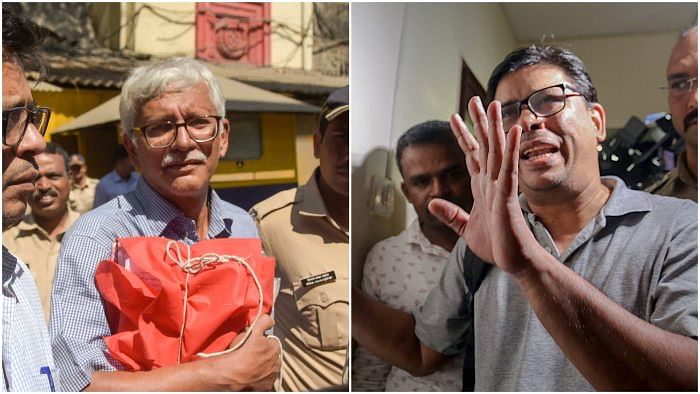
Vernon Gonsalves (L) and Arun Ferreira (R).
Credit: PTI File Photos
The Supreme Court’s judgement granting bail to Vernon Gonsalves and Arun Ferreira indicates that, even under a strict anti-terrorism statute, denial of bail does not have to be the norm. The severe bail requirements of the Unlawful Activities (Prevention) Act have routinely been used to deny personal liberty to activists, students, journalists, and others.
In the past, the Supreme Court has not been particularly helpful in UAPA matters. Similar clauses in previous harsh legislation have been ruled constitutional. The prosecution’s case followed a pattern that had become all too familiar in all Elgar Parishad cases. After their arrest, the National Investigation Agency allegedly recovered various documents and pamphlets calling for a revolution. The prosecution relied on statements from protected witnesses and third-party communication to link the accused with the banned Communist Party of India (Maoist), both in terms of membership and fundraising.
In its order, the SC stated that the accused do not attract the offences under 15(1)(b). Therefore, prima facie, the alleged literature recovered from the appellants does not establish that they engaged in any activity that would constitute overawing any public official through criminal force or attempts to do so. There are no allegations against them of causing the death of any public functionary or attempting to do so.
The court also addressed the matter of terrorist funding. Section 17 pertains to raising funds for terrorist activities, and Section 40 addresses raising funds for terrorist organisations. The prosecution used accounts acquired from a co-accused’s computer. The court ruled that this was insufficient proof to demonstrate actual money transferred. Such account statements cannot be used to deny bail in the absence of evidence of the actual receipt of funds.
Regarding the letters recovered from the co-accused’s computers and their involvement in the activities of the banned outfit, the court reached a significant conclusion. It stated that these letters have weak probative value since they were recovered from the accused. In actuality, the court said that the contents of the letters through which they are sought to be implicated are hearsay evidence. Many of the other defendants in the Elgar Parishad case should benefit from this, not only for bail but also for trial.
Section 20 of UAPA, under which Teltumbde, Gonsalves, and Ferreira are accused, deals with membership in a terrorist organisation. The Supreme Court could have easily followed a bad precedent from the past and ruled that passive membership in a terrorist organisation was sufficient to constitute the crime under Section 20. The Bombay High Court ruled in Teltumbde’s case that mere membership would not suffice unless it was combined with a terrorist deed. The Supreme Court supported this view, which positively affects anyone accused of membership in a terrorist organisation without actively participating in a terrorist attack.
The Court also stated that there was no credible evidence linking IAPL to the CPI(Maoist). The CPI (Maoist) and all its formations and frontal organisations are prohibited under the UAPA. Frontal organisations are not classified, and no government notification prohibits them. According to the charge sheet, IAPL was a frontal organisation, and Ferreira was a member.
Since all the evidence from the NIA was circumstantial and barely connected anything directly to the accused, the court ruled that the detention of the accused could not be extended. The court also mentioned a lengthy detention of five years. However, the court relied on the concept of liberty as guaranteed by Article 21 and held that when a bail-restricting clause is invoked based on materials with low probative value or quality, the constitutional court can resort to Article 21 to release a person on bail.
In UAPA matters, the courts have generally been of little help for the accused, as seen in cases like Zahoor Ahmed Shah Watali and Anup Bhuyan. The judgement in Anup Bhuyan case had set a disastrous precedent, observing that even after an organisation is declared unlawful, continuing membership would attract a penalty under the Act. These judgements by the court have aided the government and the administration in silencing the voices of activists, lawyers, and all the opposition or resistance to the state.
UAPA has been widely used, particularly recently, against minorities, democratic rights activists, journalists, lawyers, academics, trade unions, student activists, cultural rights activists, and Dalit and tribal rights activists. Courts have been hesitant to grant bail in such cases. In this context, the current decision is a breath of fresh air, offering hope that it will go a long way in defending the personal liberty of marginalised voices.
(The writer is a legal researcher)